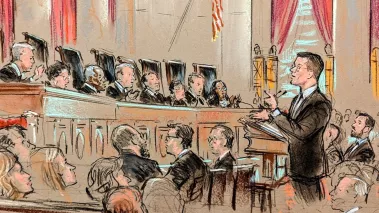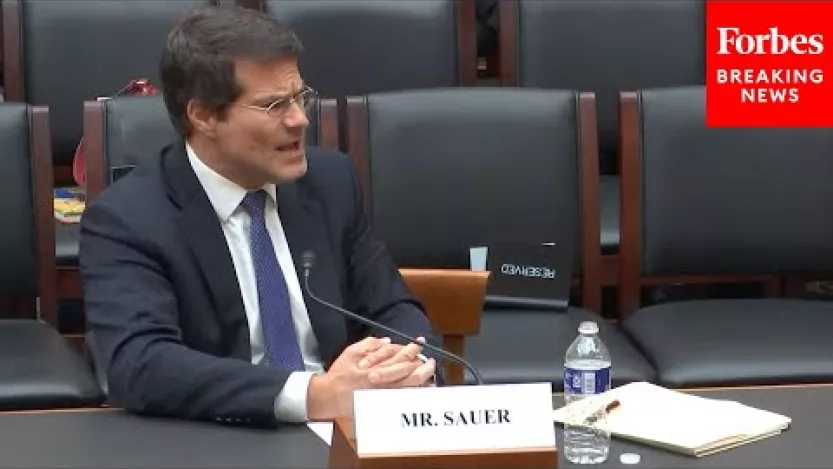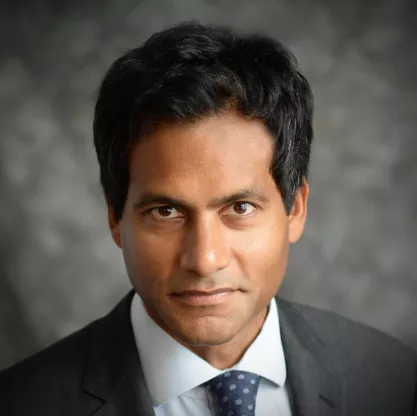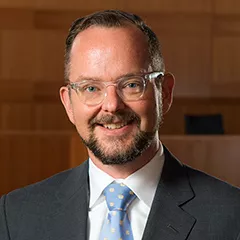Table of Contents
D. John Sauer, the next Solicitor General — the government’s SCOTUS lawyer in First Amendment cases — First Amendment News 448

William Hennessy
D. John Sauer argued on behalf of former Donald Trump before the Supreme Court in Trump v. United States.
The position of Solicitor General of the United States was created by the Statutory Authorization Act of June 22, 1870. The Act states that there shall be an officer “learned in the law” to be called the Solicitor General, to assist the Attorney General in the performance of his or her duties. By that measure, and unlike some of the other Trump nominees, D. John Sauer is “learned” indeed. Since he is the one most likely to argue the government’s case in the Supreme Court in future cases, his qualifications and views on law (including First Amendment law) are important.
Credentials
Mr. Sauer graduated from Duke University with a Bachelor of Arts in philosophy and a Bachelor of Science in electrical engineering. He was then off to Oriel College at the University of Oxford on a Rhodes Scholarship for a Bachelor of Arts in theology, followed by a Master of Arts in philosophy from Notre Dame. At Harvard, he was the articles editor of the Harvard Law Review and received his Juris Doctor degree magna cum laude in 2004.
Sauer clerked for Fourth Circuit Judge J. Michael Luttig and then for Supreme Court Justice Antonin Scalia. He then served as a federal prosecutor for five years.
In January 2017, then-Missouri Attorney General Josh Hawley appointed Sauer as Solicitor General of Missouri.
Experience
As portrayed by Amy Howe over at SCOTUSblog:
In December 2020, Sauer led a group of states in filing a “friend of the court” brief supporting Texas’s unsuccessful efforts to overturn the results of the 2020 election in four battleground states won by Joe Biden. Sauer wrote that Texas’s allegations “raise important questions about election integrity and public confidence in the administration of Presidential elections,” but the justices concluded that Texas lacked a legal right, known as standing, to bring its case.
And in 2022, Sauer (along with nine other states) challenged the Biden administration’s COVID vaccine mandate for workers in federally funded healthcare facilities. The Supreme Court declined to take up his petition for review.
After stepping down as Missouri’s solicitor general, Sauer formed his own law firm, the James Otis Law Group.
[. . .]
In private practice, Sauer has continued to litigate hot-button issues. Last term he represented Louisiana in its unsuccessful effort, joined by Missouri, to limit the government’s ability to communicate with social media companies about their content moderation policies. And he currently represents state officials defending an Arizona law that bars transgender women and girls from competing in college and school sports.
Most notably, Sauer represented former President Donald Trump in the U.S. Court of Appeals for the District of Columbia Circuit regarding the issue of presidential immunity in the criminal case of United States of America v. Donald J. Trump. Thereafter, he successfully represented Mr. Trump in the Supreme Court.
On censorship and social media
[T]he federal Censorship Enterprise has succeeded in transforming online discourse throughout America by rendering entire viewpoints virtually unspeakable on social media — the “modern public square.” It also directly interferes with another cherished First Amendment freedom — the right of citizens to organize to petition the government for redress of grievances. This ongoing distortion of the most fundamental American freedom, the right to free speech, is intolerable under the First Amendment.”
— Testimony of D. John Sauer (July 20, 2023)
* * * *

Related
- “Trump FCC chair pick stresses need to ‘restore’ First Amendment rights,” Fox News (Nov. 19)
- “Trump Names Brendan Carr, Senior GOP Leader at FCC, To Lead the Agency,” First Amendment Watch (Nov. 18)
Jaffer on ‘Trump’s censorial agenda’
- Jameel Jaffer, “Don’t assume the first amendment will thwart Trump’s pro-censorious agenda,” The Guardian (Nov 15)

A president who intends to prosecute journalists, deport student protesters, imprison flag-burners, shut down broadcasters and throw the book at whistleblowers – to list just a few of president-elect Donald Trump’s speech-suppressive ideas – is likely to collide very quickly with the first amendment.
But whether the first amendment will be a real obstacle to Trump’s censorial agenda is difficult to predict. Some of Trump’s ideas will require the US supreme court to address free speech questions it has long avoided, while others will implicate precedents that the court may be eager to revisit. Trump has already appointed three of the court’s justices and he may have the opportunity to appoint more – at a time when the very meaning of free speech is deeply contested. So, yes, Trump will run up against the first amendment, but don’t take for granted that he will be thwarted by it.
Related
- “Trump Wants to End ‘Wokeness’ in Education. He Has Vowed To Use Federal Money as Leverage,” First Amendment Watch (Nov. 18)
Palin trial date against the New York Times set for April
- “Judge Sets April Trial Date for Sarah Palin’s Libel Claim Against The New York Times,” First Amendment Watch (Nov. 14)

A federal judge set an April retrial date on Tuesday for Sarah Palin’s libel case against The New York Times, even as lawyers on both sides for the first time said they hope to engage in talks to settle the case.
Judge Jed S. Rakoff said during a telephone conference that the trial can begin April 14 if a deal can’t be made before then.
The lawsuit by the onetime Republican vice-presidential candidate and ex-governor of Alaska stemmed from a 2017 Times’ editorial. Rakoff had dismissed the case in February 2022 as a jury was deliberating, but the 2nd U.S. Circuit Court of Appeals in Manhattan restored her claim in August.
David L. Axelrod, a lawyer for the Times, told Rakoff that lawyers had spoken about exploring how to resolve the case, particularly since it has become harder to locate witnesses because so much time has passed.
“It may be that we don’t need a trial at all,” he said.
Kenneth G. Turkel, a lawyer for Palin, agreed, noting that the two sides had never tried mediation.
He said lawyers wanted “to give it a shot.”
Rakoff seemed eager for a settlement.
SCOTUS denies review of campaign finance case
The two issues raised in the case were:
(1) Whether Alaska’s requirement that individual donors must file duplicative reports of their political contributions within 24 hours of making them violates the First Amendment; and (2) whether Alaska’s extensive on-ad disclosure requirements violate the First Amendment.
Related
- Amy Howe, “Supreme Court won’t hear challenge to Alaska campaign finance laws,” SCOTUSblog (Nov. 18)
Book ban fight continues in Florida
- Douglas Soule, “Florida again argues books ban are ‘government speech,’ not prohibited by First Amendment,” Tallahassee Democrat (Nov. 19)
In yet another case, Florida’s government is arguing that book removals in public schools are “government speech,” meaning they are unrestricted by the First Amendment.
It’s a controversial legal argument, which free speech advocates have called “authoritarian,” but one that the state has been particularly passionate about over the last year. Attorney General Ashley Moody’s office even recently sent a representative to make it on behalf of a Texas community’s public library.
In the latest instance, Moody’s office, representing top education officials appointed by Gov. Ron DeSantis, asked a federal judge to dismiss a new lawsuit — one of a multitude in Florida — filed over school bookshelf decisions.
“The selection of public-school-library books is government speech and therefore not subject to the First Amendment,” it said in a Friday filing.
“When the government speaks, it ‘can freely select the views that it wants to express, including choosing not to speak and speaking through the removal of speech that the government disapproves,’ “ the office continued, quoting another case.
Related
- Trudy Ring, “Book bans nearly triple in 2023-2024 school year: PEN America report,” The Advocate (Sept. 23)
New scholarly article on theory of corporate speech rights
- Sean J. Griffith, “Corporate Speech & Corporate Purpose: A Theory of Corporate First Amendment Rights,” Free Speech Journal (2024)

The negative speech right (the right to refrain from speaking) strains the standard rationale for corporate speech rights. First Amendment jurisprudence justifies speech rights with a mix of intrinsic and instrumental rationales. The intrinsic rationale is derived from the natural rights of persons, and often thought not to apply to corporations. Meanwhile, the instrumental rationale, grounded on the value of speech in promoting self-government, would seem not to apply to the negative right. Remaining silent, after all, does little to advance public debate.
This article uses the SEC’s shareholder proposal rule to examine the larger question of corporate First Amendment rights, ultimately finding in the doctrine of corporate purpose a stable doctrinal foundation for corporate speech rights. Corporations are not natural persons, but they exist to serve the purposes of those who form them — that is, their shareholders. Sometimes, as in the case of a closely held firm, the scope of shareholders’ shared purposes may be broad, encompassing a wide array of values held in common. However, in the context of publicly held firms, where conflict in the shareholder base is inevitable, the scope of shared values narrows to one: shareholder wealth maximization.
This vision of corporate purpose implies a limit to the state’s ability to abridge corporations’ negative speech rights. Government can compel speech only when the compulsion is consistent with corporate purpose.
New scholarly article on ‘the other press clauses’
- Christina Koningisor, “The Other Press Clauses,” SSRN (Oct. 15)

The Supreme Court has consistently declined to interpret the First Amendment to extend exclusive protections for the press. Across areas like newsgathering, rights of access, and protection of confidential sources, the Court has repeatedly rejected the press’s claims to particularized constitutional treatment. Yet many states have pursued a different approach. Each state constitution contains independent press and speech provisions. These provisions diverge from the First Amendment-in their texts, drafting histories, and interpretive precedents-in ways that can be rights-expanding for the press.
This Essay argues that these state constitutional provisions have been underutilized by press advocates. These state constitutional press and speech protections, along with other related constitutional provisions, hold promise as a powerful source of independent protection for journalists. They can be used to fill in gaps left by the Supreme Court’s often flimsy and scattershot First Amendment approach. They can be more easily amended to respond to new and growing threats to the press. And they can operate as a safety net to catch the press if the Roberts Court decides to withdraw critical First Amendment press protections. Moreover, the lessons of the state constitutional experience can be used to support expanded federal press protections under the First Amendment.
‘So to Speak’ podcast with Ayaan Hirsi Ali on a culture of conformity

- “Ayaan Hirsi Ali will not submit,” FIRE (Nov. 14)
Ayaan Hirsi Ali grew up in a culture of conformity. She was beaten and mutilated. She was told who she must marry.
Eventually, she rebelled.
“You don’t speak up at first,” she told us. “First you leave and you find a place of safety. It’s only after that experience that it occurred to me to speak up about anything."
Hirsi Ali is a human rights activist, a research fellow at the Hoover Institution, the founder of the AHA Foundation, and the host of the Ayaan Hirsi Ali Podcast. She is also the best-selling author of a number of books, including “Infidel,” “Nomad,” “Heretic,” and, “Prey.”
Her latest initiative is Courage Media, which describes itself as a space for courageous conversations.
Blackman on the history of sedition and prior restraint
- Josh Blackman, “Sedition and Prior Restraint,” The Foundation for the Constitution (Nov. 13)

More in the news
- Nan Levinson, “The First Amendment Will Suffer Under Trump,” The Nation (Nov. 19)
- Eugene Volokh, “Apparent AI Hallucinations in AI Misinformation Expert’s Court Filing Supporting Anti-AI-Misinformation Law,” The Volokh Conspiracy (Nov. 19)
- Megan Tomasic, “School officials around Western Pa. under fire over political posts, but experts say they have First Amendment rights,” Pittsburgh Post-Gazette (Nov. 18)
- Eugene Volokh, “College Baseball Coach’s Defamation Case, Alleging School Said He Was Fired Because He Acted in Racist Ways, Allowed to Go Forward,” The Volokh Conspiracy (Nov. 18)
- Hannah Cox, “Federal TikTok Ban Violates First Amendment Free Speech Rights,” Washington Examiner (Nov. 18)
- “Protect the First Amendment: Oppose the Antisemitism Awareness Act,” FIRE (Nov. 16)
- “FIRE statement on congressional leaders smuggling unconstitutional Antisemitism Awareness Act into a must-pass defense bill,” FIRE (Nov. 15)
2024-2025 SCOTUS term: Free expression and related cases
Cases decided
- Villarreal v. Alaniz (Petition granted. Judgment vacated and case remanded for further consideration in light of Gonzalez v. Trevino, 602 U. S. ___ (2024) (per curiam))
- Murphy v. Schmitt (“The petition for a writ of certiorari is granted. The judgment is vacated, and the case is remanded to the United States Court of Appeals for the Eighth Circuit for further consideration in light of Gonzalez v. Trevino, 602 U. S. ___ (2024) (per curiam).”)
Review granted
Pending petitions
- 360 Virtual Drone Services LLC v Ritter
- Turco v. City of Englewood, New Jersey
- Coalition Life v. City of Carbondale
Petitions denied
- Smith v. Stillie
- No on E, San Franciscans Opposing the Affordable Care Housing Production Act, et al. v. Chiu
- Henderson v. Texas
- Nassif v. United States
Last scheduled FAN
FAN 447: “149 days and counting! Will the White House grant a posthumous pardon in the D.M. Bennett Case?”
This article is part of First Amendment News, an editorially independent publication edited by Ronald K. L. Collins and hosted by FIRE as part of our mission to educate the public about First Amendment issues. The opinions expressed are those of the article’s author(s) and may not reflect the opinions of FIRE or Mr. Collins.
Recent Articles
Get the latest free speech news and analysis from FIRE.

Can the government ban controversial public holiday displays?

The trouble with banning Fizz

FIRE's 2025 impact in court, on campus, and in our culture


